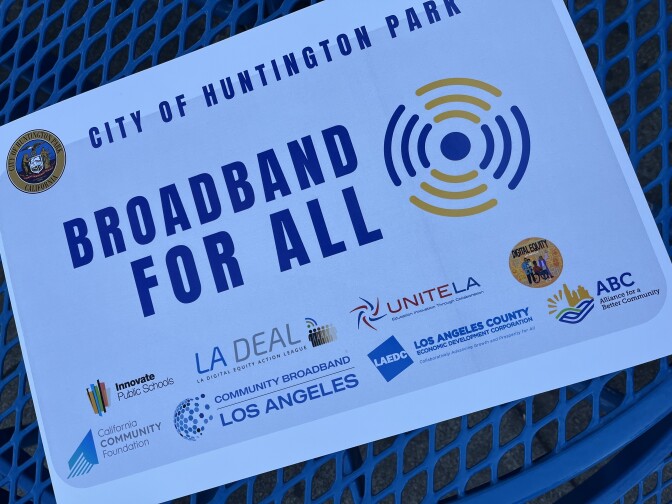This story is free to read because readers choose to support LAist. If you find value in independent local reporting, make a donation to power our newsroom today.
‘The private sector has failed’: Why Huntington Park plans to launch its own internet service

Arturo Flores, the vice mayor of Huntington Park, has come up with his own solution to the relative lack of fast, affordable, reliable internet service in his neighborhood: He uses a T-mobile hotspot at his home.
“It’s just myself and I don't require a lot of bandwidth, but I imagine that families don't have that option,” he said.
Flores says he was forced to do that because it was the most affordable option. AT&T wasn’t available at the time, and Google Fiber doesn’t operate in the low-income area. Families who want more bandwidth say they have to pay around $70 to $120 for what is often unreliable, slow service.
Which is why the city has decided to step into the broadband market itself. Huntington Park applied for — and has just won — a $25 million state grant to build its own municipal service in south east Los Angeles County.
Why now
“What we're highlighting is that the private sector has failed in an area — that obviously requires public intervention,” Flores said.
The money comes from the state’s $2 billion last-mile grant fund. The term “last-mile” refers to the final leg in a broadband network that physically connects peoples’ homes to the internet.
Resident Marisol Coronado says she saw what happened to her son during remote learning in the pandemic, when he struggled with poor internet service.
“I witnessed how difficult it was for my son to stay connected to his classes… he would get nervous and that would make me nervous,” she said. “And that’s when I realized that it’s necessary to have a connection that’s fast and reliable.”
Coronado works as a parent leader with the group Alliance for Better Community, or ABC. She spoke at a news conference Wednesday with city officials to celebrate the grant win and to encourage leaders to keep community members in the loop as they plan to launch the service.

The timeline
Huntington Park will have two years to complete the project once it gets a green light from the California Public Utilities Commission to start building.
Three local neighborhoods, including Huntington Park, won a combined $96 million out of a total $105 million that’s been allocated for Los Angeles County. A coalition called the Gateway Cities Council of Governments won a $46 million grant and a nonprofit in Crenshaw will receive $25 million.
Larger providers like AT&T and Spectrum applied for millions of grant dollars for broadband projects in the L.A. area, but so far have not received any funding. An LAist review of their applications in April found that half of those proposed projects included some of the most affluent neighborhoods in the southland, including Bel Air, Pacific Palisades and Chatsworth Lake Manor.
Mayor Karina Macias said she looks forward to partnering with other city leaders on the southeast side of L.A. to reach as many people as possible. Huntington Park is part of the Gateway Cities coalition, but submitted a separate application for funding.
“This is an opportunity for the city of Huntington Park to be a leader with other SELA communities to close the digital divide,” she said. “Because connectivity is everything these days.
What the funding will support
Huntington Park will use the grant money on infrastructure and to hire personnel for the project. While $25 million may sound like a lot, Vice Mayor Arturo Flores says the city may need to allocate additional funds and look for other funding sources to successfully launch its new service.
It won’t be free, but the city has committed to offering affordable rates for at least the first ten years, he said.
“What we want to do is deliver a higher quality of broadband, either at lower or the same price points [as the private sector],” he said.
The project will bring about 50 miles of high-speed fiber to the area and will leverage the state’s middle-mile backbone network that is expected to run through Huntington Park, though construction plans are still being finalized.
The California Public Utilities Commission, which is distributing the money, has allocated about $1.2 billion in last-mile funding across the state this year. The remaining $800 million in funds will be distributed on a rolling basis through 2026.
Miguel Santana, president and CEO of the California Community Foundation, said residents are going to have to continue to pressure local and state officials so the money gets fully implemented and reaches the most vulnerable people.
“Receiving the grant was not easy, it required a lot of advocacy and persistence,” he said. “But really in some ways the work is just beginning.”











